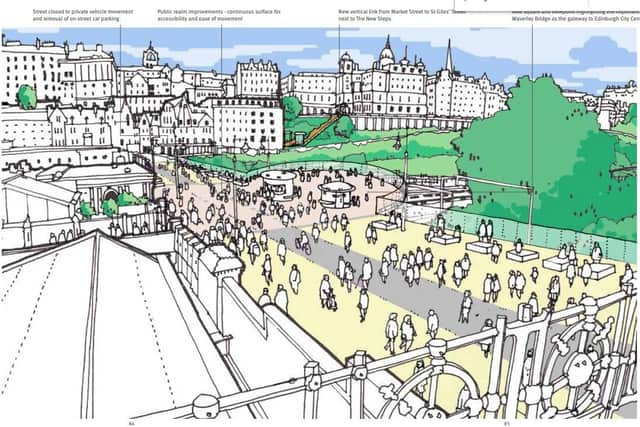Council slammed for 'unforgivable omission' and 'misguided' thinking in City Mobility Plan by walking charity


A charity dedicated to improving walking for people living in cities and across the UK has labelled Edinburgh City Council’s plans for changing transport infrastructure “misguided” and including “unforgiveable omissions”.
Responding to the official consultation into the City Mobility Plan, which sets out the council’s vision on how residents and visitors will move around Edinburgh, Living Street Edinburgh criticises the lack of focus on walking.
Advertisement
Hide AdAdvertisement
Hide AdThe charity also highlights a lack of detail in the plan, criticising the absence of any detail around resources, capacity and skills needed to deliver it.


However, the charity adds that they broadly support the overall plan, stating that it is “largely welcome”.
The City Mobility Plan includes projects such as potentially extending the tram to the Royal Infirmary and Fountainbridge, as well as pedestrianising much of the city centre and radically changing the way buses operate in the city.
In a statement published on their website, Living Streets said the principal aim of the plan should be to ensure walking priority is delivered on the street.
Advertisement
Hide AdAdvertisement
Hide AdIt adds: “Regrettably, the draft plan makes no mention whatsoever of the movement hierarchy or the Sustainable Travel Hierarchy – this is an unforgiveable omission, which must bring into question the Council’s commitment to everyday walking.”
The charity states that it welcomes the planned reduction in the number of private vehicles in the city centre, and praised the council for bringing the debate about the mobility of the city forward.
The statement adds: “We welcome the vision of making Edinburgh far less dependent on motor vehicles and to make streets much more people-friendly. We also commend the Council for its leadership in starting and pursuing the public debate about future mobility in the city, as we cannot go on as we are.
“However, the Draft City Mobility Plan appears to be more a statement of largely welcome intentions, rather than a delivery plan. It does not indicate the resources, capacity and skills needed to deliver it, or how these will be acquired.
Advertisement
Hide AdAdvertisement
Hide Ad“The Plan does not give sufficient emphasis to the need to promote ‘everyday walking’ by improving pedestrian infrastructure across Edinburgh – in the centre, in ‘town centres’ across the city, and in residential areas. The Plan is misguided in its ill-thought-out approach to buses.”
The charity adds it would want to see a larger focus on measures such as widening pavements, enforcing traffic and parking rules and more focus on pragmatics over “aspirational but wooly visions”.
Cllr Lesley Macinnes, Transport and Environment Convener, said: “Our City Mobility plan sets out new policy measures over the next ten years focusing on public transport provision, improved cycling, walking and electric vehicle infrastructure and reducing the volume of polluting traffic in the city.
“These draw on feedback gathered during public engagement carried out in 2018 and is very important that we continue to have a conversation with our residents, businesses and other stakeholders as we make these momentous decisions.
Advertisement
Hide AdAdvertisement
Hide Ad“Promoting and encouraging the use of public transport, along with active travel, is a key priority under our City Mobility Plan. This is about serving people in every corner of the city as effectively as possible while creating high quality, people-friendly spaces for those on foot or bike.
“During this difficult lockdown period it is clear that there is a strong latent desire within the city for walking, cycling and wheeling where possible and this helps reinforce the objectives behind our City Mobility Plan.
“We really want to know what people think about these proposals so I would encourage anyone who is interested to share their views before the consultation closes on 30 April 2020.”
Comment Guidelines
National World encourages reader discussion on our stories. User feedback, insights and back-and-forth exchanges add a rich layer of context to reporting. Please review our Community Guidelines before commenting.